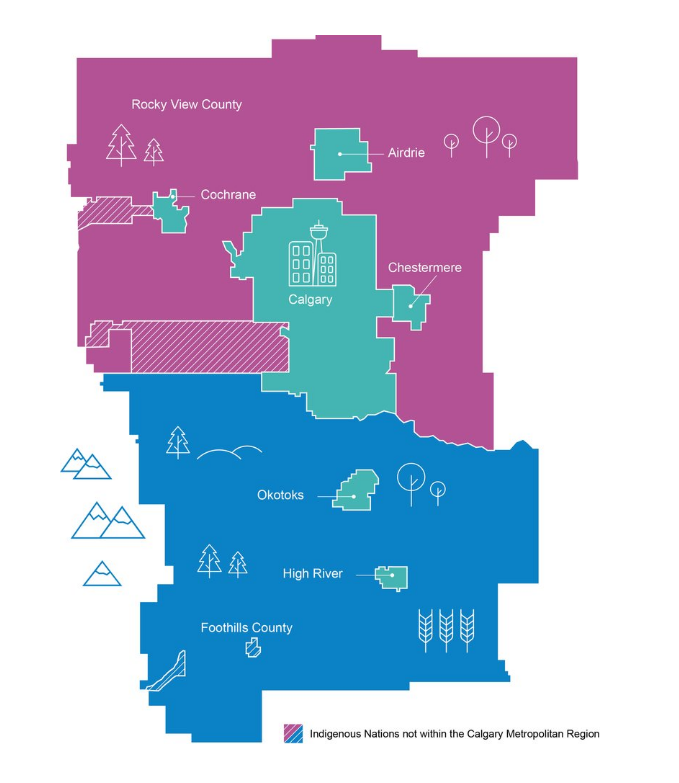Intergovernmental & Corporate Strategies
Intergovernmental & Corporate Strategy's (ICS) mandate is to support Council directions and advance The City of Calgary’s strategic interest. We work collaboratively with City departments and business units to identify issues and opportunities to advocate to other orders of government including regional and civic partners.
Our work focuses on evolving Government Relations conversations into Corporate Strategy actions.

Muni Government Act
Muni Government Act
Municipal Government Act
The Municipal Government Act (MGA) is the law under which all Alberta municipalities are empowered to shape their communities. The MGA defines how The City of Calgary and other municipalities function, develop land, raise funds for things like services, and more.
Currently, the Government of Alberta is in the process of modernizing the MGA, which was first established in 1967 and it had not been comprehensively review until now. The province and The City of Calgary are working collaboratively on this review and The City’s MGA Review Submission is published and available for viewing.
As part of the review there have been two legislative amendments and two amendment Bills (Bill 20 – Municipal Government Amendment Act and Bill 21 – Modernized Municipal Government Act) which have led to the province and its two largest municipalities, Calgary and Edmonton, developing City Charters and Growth Management Boards.
City Charter
City Charter
City Charter
The City of Calgary and The City of Edmonton are working with the Government of Alberta to develop City Charters.
A city charter is a regulation that provides a city with specific flexibilities and authorities to better meet the needs of citizens. The city charters for Calgary and Edmonton will enable the cities to modify or replace provisions in the Municipal Government Act (MGA) or any other provincial Act or regulation, where the province has specifically granted authority to do so.
A City Charter is intended to cover a range of issues from simple administrative efficiencies to complex regulatory changes. Unless explicitly outlined in the charters, all other legislation will continue to apply to the two cities.
Having Calgary-specific legislation in the form of a City Charter will better enable us to make local decisions and policies to address the large-scale challenges we face. The Charters will create the appropriate mechanisms to provide increased authority or flexibility to Calgary in a wide range of areas, including governance, planning and development, assessment and taxation, social policies and programs, energy and the environment, transportation and economic policies.
The Charter will also enable Council to develop new fiscal frameworks to provide programs and services to Calgarians to optimize efficiencies and build a strong, economically vibrant Calgary.
Fiscal framework
The cities of Calgary and Edmonton and province have agreed to a scope of work to develop a renewed fiscal framework that will consider the following elements.
New infrastructure funding formula
The province has agreed to work with the cities to replace the existing capital grants system with a funding formula based on provincial revenues.
This would mean that the cities share in the variability of provincial revenues. It provides greater predictability for both the cities and the province. This would also mean that funding would grow with the economy, which would allow cities to make investments to keep up with growth pressures.
This new system would provide predictability to both the cities and the province about funding levels, and recognize the important role that the cities have in making investments that support economic growth in Alberta.
Administrative efficiencies
The three parties will explore options for improving the efficiency and effectiveness of existing municipal authorities.
This will be limited to authorities that are currently authorized by the Municipal Government Act, and may include changes to the length and duration of Local Improvement Taxes. The three governments will also review eligible uses for special taxes to determine if the current list is appropriate for modern infrastructure projects.
Improve the administration of the destination marketing fee
The three parties will explore potential opportunities to improve the administration of the existing voluntary destination marketing fee that is charged by some hotels. The goal is to enhance the transparency and accountability of the revenue generated from the fee, which will continue to be directed towards tourism activities.
Increase municipal responsibility for debt management
The three parties have agreed to develop options for increasing accountability of the cities for their debt by allowing them to adopt their own stringent debt management policies, including the need to get a credit rating. This recognizes the cities’ capacity to manage their own debt.
Currently both Edmonton and Calgary’s policies far exceed the minimum standards set out in the MGA, and this will allow them to set out stringent and accountable standards for themselves.
For more information on the City Charter and Fiscal Framework please contact Jeremy Clarke at 268-1104 or jeremy.clarke@calgary.ca.
Collab Agreement
Collab Agreement
Collaboration Agreement
City charters will include both regulatory changes and a collaboration agreement. The collaboration agreement will support ongoing, long-term coordination between the two cities and the Government of Alberta. The collaboration agreement is a commitment by the 3 governments to cooperate on emerging matters of mutual interest.
The collaboration agreement highlights 3 policy and planning tables – forums for representatives from the cities and province to regularly work towards joint goals regarding:
- social policy
- transportation
- environment and climate change
The policy and planning tables will develop workplans and priorities, and are committed to report their progress to the public and elected officials.
For more information about the collaboration agreement, contact Devery Corbin at 268-1414 or Devery.Corbin@calgary.ca.
Calgary Metropolitan Regional Board
Calgary Metropolitan Regional Board
Calgary Metropolitan Regional Board
Established in 2018, the CMRB is a not-for-profit government corporation made up of elected officials from the Calgary Metropolitan Region’s 10 member municipalities.
As defined in the Calgary Metropolitan Region Board Regulation (Alberta Regulation 190/2017), the CMRB’s mandate is to support the long-term sustainability of the Calgary Metropolitan Region by:
- Ensuring environmentally responsible land-use planning, growth management and efficient use of land
- Developing policies regarding the coordination of regional infrastructure investment and service delivery
- Promoting the economic wellbeing and competitiveness of the Calgary Metropolitan Region
- Developing policies outlining how the Board shall engage the public in consultation View Regulation
The Municipalities of the CMRB include: (see map)
- City of Airdrie
- City of Calgary
- City of Chestermere
- Town of Cochrane
- Foothills County
- Town of High River
- Town of Okotoks
- Rocky View County
- Town of Strathmore
- Wheatland County (portion as described in the regulation)

For more information on the CMRB, go to www.calgarymetroregion.ca
CMRB Draft Growth Plan
The ten municipalities in the Calgary Metro Region are working together to develop a long-term plan for managed, sustainable growth in the region. There have been two phases of public engagement on the Regional Growth Plan which took place in 2020. Click here to access the "What We Heard Report" for a summary of the Phase 2 engagement process that took place in November.
What has been proposed for the Calgary Metro Region is to manage growth differently than experienced in the past. Through higher density, more redevelopment, shared servicing, a greater mix of place types and collaboratively planning for “transit ready” development along future transit corridors, CMRB hopes to reduce land consumption, save money, and realize the benefits associated with regional planning.
The proposed approach from Phase 2 of public engagement has three key characteristics:
- Place Type Allocation,
- Transit-Ready Corridors, and
- Joint Planning Areas.
Planning is underway for a third phase of public engagement to test the ideas that are proposed in the Draft Regional Growth Plan against the CMRB's mandate to support the long-term sustainability of the Calgary Metropolitan Region by ensuring environmentally responsible land-use planning, growth management and efficient use of land. For more information please go to www.calgarymetroregion.ca. including FAQs to learn more about what’s being proposed, how the proposed approach was developed, including how public input helped shape the proposal.


